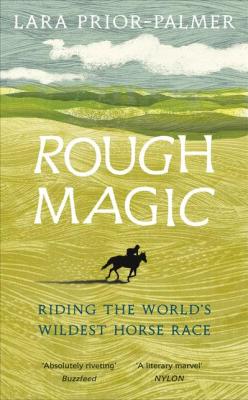Review by Liz Dexter

Lara is by her own account a bit scatter-brained. She’s been described as away with the fairies, didn’t see the point of school past a certain age and grew up a self-confessed tomboy with several older brothers. She also seems to have been blithely unaware of the dangers of telling untruths in order to get into a race she isn’t prepared for and is too late to apply for – and then only goes and wins it (this is not a spoiler: it’s mentioned very early on and also in many reviews).
Well, you have to admire her even though you wouldn’t want her organising your next holiday. If she commits to a thing, she does it, and having found herself unable to settle into standard life, she hopes to sort of shake herself down by doing this. It’s unclear whether she actually does or not, as the book ends with the end of the race, pretty well, but that’s one of the major charms of the book: she resists easy, pat narratives and neat stories, telling it how she feels it is at the time, owning her competitiveness, even when it’s the odd one of not wanting the other rider to win more than wanting to win herself. There’s a tiny bit about her life after the race which involves an illness, suddenly inserted into the text, but apart from that we know little of what happened next. It’s all about the run-up to the race and the race. The narrative is broken up with her own thoughts and then letters to her mum – I’m not sure if these were written and sent or just written in her head, although it doesn’t really matter.
The other thing you’re not going to find here, along with answers about how it changed her life, is an epic relationship between woman and horse. It turns out that, for the good of the horses, the riders in the Mongol Derby change horses at every checkpoint, riding at least two different horses a day, if not more. She soon gets used to asking for the fastest and naughtiest horse, as that will be the one that will take her to victory, and then off she goes into the distance, long legs hanging down the short horse’s sides.
Now, like me, you might have noticed the author’s name. And yes, she is related to THAT Prior-Palmer, Lucinda, her aunt, the amazing three-day-eventer I grew up hearing about. Amusingly, Lucinda’s brother, Lara’s father, is depicted as loathing everything to do with horses …
“and please don’t talk about them at mealtimes”
But of course you can’t really escape them, and Lara does have some riding lessons from her aunt, and some brutally honest advice later on. There are stories about Lucinda’s legendary nerves of steel, including a period going mute in order to get taken out of school, and it’s telling that her aunt and the rest of the family seem to spend their life in motion, escaping from something and never settling: it seems inevitable that she’ll end up on some epic trek or other.
As well as avoiding a traditional “how this changed my life” narrative, the author has some very interesting views on history, empire and culture. Early on in the book she says she notices that British people go a bit quiet when Mongolia is mentioned, and suggests this is because it wasn’t somewhere that Britain ever conquered:
“Where British culture has not forced its influence, we tread carefully, sensing a different lay of the land.”
and she’s great on the tradition of the stiff upper lip:
“Even inside my head, I never went near phrases such as ‘I am scared’, ‘I am sad’, or ‘I am angry’. Perhaps this failure to emotionally engage linked me to the long tradition of British adventurers who refused to let anything flummox them, even if their partner’s leg fell off in the Arctic.”
although she also notes that this allowed them to cope with running “an often brutal empire”.
I really liked this extra level of perception and thought, at odds, perhaps, with the scatter-brained persona she likes to present to the world (yes, she has an unexpected period: all the reviews seem to dwell on this. But it doesn’t faze her, which is perhaps more the point). She calls the worst excesses of this “Pixie mode” where she will automatically ask peculiar questions in meetings or chatter aimlessly. Fair enough: she knows her own self.
I’ve never seen a sentence like this at the end of the acknowledgements page of a book, and perhaps this sums up its idiosyncratic yet attractive and positive feel:
“To all the nonhuman forces, especially horses, Appleshaw [her parents’ place in the country], the Pacific, the steppe, the Plains and elsewhere, for their care”

Liz Dexter can ride but her scariest adventure has been a rather tame trek on an Icelandic Horse. She blogs about reading and running at www.librofulltime.wordpress.com
Lara Prior-Palmer, Rough Magic: Riding the World’s Wildest Horse Race (Ebury Press, 2019). 9781785038853, 320 pp. Hardback


1 comment
Comments are closed.